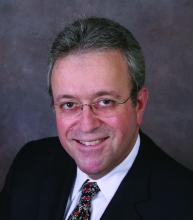User login
We have several new, young employees in my front office, and it had been quite awhile since I had followed my own advice of “eavesdropping” on their telephone conversations with patients. You would think that Millennials, with all the time they spend on phones, would have little to learn in that department – until you remember that Instagram and Snapchat do not require interpersonal skills.
So I. If you want to adapt it for your own use, be my guest:
• The first impression a new patient has of our office is usually made by our receptionists. Even now, in the era of texting and e-mail, the telephone remains our primary point of contact with new and long-time patients. The way we answer it determines, to a significant extent, how the community thinks of us, as people and as health care providers.
• Everyone in the office needs to know how to answer the phone professionally. If you notice that a phone is ringing and the receptionists are unable to answer it, please pick up the phone; an incoming call must never go unanswered.
• Answer all incoming calls before the third ring.• Answer warmly, enthusiastically, and professionally. Since the caller cannot see you, your voice is the only impression of our office a first-time caller will get.
• Identify yourself and our office immediately. “Good morning, Doctor Eastern’s office. This is __________, how may I help you?” (No one should ever have to ask what office they have reached, or to whom they are speaking.)
• Speak like a professional. Don’t use slang or buzzwords. Instead of “totally” or “for sure,” for example, say “certainly” or “of course.” If you tend to use fillers (“uh huh,” “um,” “like,” “you know,” etc.), train yourself not to use them in the office.
• Adopt a positive vocabulary – one that focuses on helping people. For example, rather than saying, “I don’t know,” say, “Let me find out for you,” or “I’ll make sure someone gets back to you on that.”
• Offer to take a message if the caller has a question or issue you cannot address. Assure the patient that the appropriate staffer will call back later that day. That way, office work flow is not interrupted, and the patient still receives a prompt (and correct) answer.
• All messages left overnight with the answering service must be returned as early as possible the very next business day. This is a top priority each morning. Few things annoy callers trying to reach their doctors more than unreturned calls. If the office will be closed for a holiday, or a response will be delayed for any other reason, make sure the service knows, and passes it on to patients.
• If the phone rings while you are dealing with a patient in person, that patient is your first priority. Put the caller on hold, but always ask permission before doing so, and wait for an answer. Never leave a caller on hold for more than a minute or two unless absolutely unavoidable.
• Never answer with, “Doctor’s office, please hold.” To a patient, that is even worse than not answering at all. No matter how often your hold message tells callers how important they are, they know they are being ignored. Such encounters never end well: Those who wait will be grumpy and rude when you get back to them; those who hang up will be even more grumpy and rude when they call back. Worst of all are those who don’t call back and seek care elsewhere – often leaving a nasty comment on social media besides.
• Maintaining patient confidentiality is a top priority. It makes patients feel secure about being treated in our office, and it is also the law. Be cautious about all information that is given over the phone. Don’t disclose any personal information unless you are absolutely certain you are talking to the correct patient. If the caller is not the patient, never discuss personal information without the patient’s permission.
Keep in mind that patients and others in the office may be able to overhear your phone conversations. Keep your voice down; never use the phone’s hands-free “speaker” function.
Dr. Eastern practices dermatology and dermatologic surgery in Belleville, N.J. He is the author of numerous articles and textbook chapters, and is a longtime monthly columnist for Dermatology News. Write to him at [email protected].
We have several new, young employees in my front office, and it had been quite awhile since I had followed my own advice of “eavesdropping” on their telephone conversations with patients. You would think that Millennials, with all the time they spend on phones, would have little to learn in that department – until you remember that Instagram and Snapchat do not require interpersonal skills.
So I. If you want to adapt it for your own use, be my guest:
• The first impression a new patient has of our office is usually made by our receptionists. Even now, in the era of texting and e-mail, the telephone remains our primary point of contact with new and long-time patients. The way we answer it determines, to a significant extent, how the community thinks of us, as people and as health care providers.
• Everyone in the office needs to know how to answer the phone professionally. If you notice that a phone is ringing and the receptionists are unable to answer it, please pick up the phone; an incoming call must never go unanswered.
• Answer all incoming calls before the third ring.• Answer warmly, enthusiastically, and professionally. Since the caller cannot see you, your voice is the only impression of our office a first-time caller will get.
• Identify yourself and our office immediately. “Good morning, Doctor Eastern’s office. This is __________, how may I help you?” (No one should ever have to ask what office they have reached, or to whom they are speaking.)
• Speak like a professional. Don’t use slang or buzzwords. Instead of “totally” or “for sure,” for example, say “certainly” or “of course.” If you tend to use fillers (“uh huh,” “um,” “like,” “you know,” etc.), train yourself not to use them in the office.
• Adopt a positive vocabulary – one that focuses on helping people. For example, rather than saying, “I don’t know,” say, “Let me find out for you,” or “I’ll make sure someone gets back to you on that.”
• Offer to take a message if the caller has a question or issue you cannot address. Assure the patient that the appropriate staffer will call back later that day. That way, office work flow is not interrupted, and the patient still receives a prompt (and correct) answer.
• All messages left overnight with the answering service must be returned as early as possible the very next business day. This is a top priority each morning. Few things annoy callers trying to reach their doctors more than unreturned calls. If the office will be closed for a holiday, or a response will be delayed for any other reason, make sure the service knows, and passes it on to patients.
• If the phone rings while you are dealing with a patient in person, that patient is your first priority. Put the caller on hold, but always ask permission before doing so, and wait for an answer. Never leave a caller on hold for more than a minute or two unless absolutely unavoidable.
• Never answer with, “Doctor’s office, please hold.” To a patient, that is even worse than not answering at all. No matter how often your hold message tells callers how important they are, they know they are being ignored. Such encounters never end well: Those who wait will be grumpy and rude when you get back to them; those who hang up will be even more grumpy and rude when they call back. Worst of all are those who don’t call back and seek care elsewhere – often leaving a nasty comment on social media besides.
• Maintaining patient confidentiality is a top priority. It makes patients feel secure about being treated in our office, and it is also the law. Be cautious about all information that is given over the phone. Don’t disclose any personal information unless you are absolutely certain you are talking to the correct patient. If the caller is not the patient, never discuss personal information without the patient’s permission.
Keep in mind that patients and others in the office may be able to overhear your phone conversations. Keep your voice down; never use the phone’s hands-free “speaker” function.
Dr. Eastern practices dermatology and dermatologic surgery in Belleville, N.J. He is the author of numerous articles and textbook chapters, and is a longtime monthly columnist for Dermatology News. Write to him at [email protected].
We have several new, young employees in my front office, and it had been quite awhile since I had followed my own advice of “eavesdropping” on their telephone conversations with patients. You would think that Millennials, with all the time they spend on phones, would have little to learn in that department – until you remember that Instagram and Snapchat do not require interpersonal skills.
So I. If you want to adapt it for your own use, be my guest:
• The first impression a new patient has of our office is usually made by our receptionists. Even now, in the era of texting and e-mail, the telephone remains our primary point of contact with new and long-time patients. The way we answer it determines, to a significant extent, how the community thinks of us, as people and as health care providers.
• Everyone in the office needs to know how to answer the phone professionally. If you notice that a phone is ringing and the receptionists are unable to answer it, please pick up the phone; an incoming call must never go unanswered.
• Answer all incoming calls before the third ring.• Answer warmly, enthusiastically, and professionally. Since the caller cannot see you, your voice is the only impression of our office a first-time caller will get.
• Identify yourself and our office immediately. “Good morning, Doctor Eastern’s office. This is __________, how may I help you?” (No one should ever have to ask what office they have reached, or to whom they are speaking.)
• Speak like a professional. Don’t use slang or buzzwords. Instead of “totally” or “for sure,” for example, say “certainly” or “of course.” If you tend to use fillers (“uh huh,” “um,” “like,” “you know,” etc.), train yourself not to use them in the office.
• Adopt a positive vocabulary – one that focuses on helping people. For example, rather than saying, “I don’t know,” say, “Let me find out for you,” or “I’ll make sure someone gets back to you on that.”
• Offer to take a message if the caller has a question or issue you cannot address. Assure the patient that the appropriate staffer will call back later that day. That way, office work flow is not interrupted, and the patient still receives a prompt (and correct) answer.
• All messages left overnight with the answering service must be returned as early as possible the very next business day. This is a top priority each morning. Few things annoy callers trying to reach their doctors more than unreturned calls. If the office will be closed for a holiday, or a response will be delayed for any other reason, make sure the service knows, and passes it on to patients.
• If the phone rings while you are dealing with a patient in person, that patient is your first priority. Put the caller on hold, but always ask permission before doing so, and wait for an answer. Never leave a caller on hold for more than a minute or two unless absolutely unavoidable.
• Never answer with, “Doctor’s office, please hold.” To a patient, that is even worse than not answering at all. No matter how often your hold message tells callers how important they are, they know they are being ignored. Such encounters never end well: Those who wait will be grumpy and rude when you get back to them; those who hang up will be even more grumpy and rude when they call back. Worst of all are those who don’t call back and seek care elsewhere – often leaving a nasty comment on social media besides.
• Maintaining patient confidentiality is a top priority. It makes patients feel secure about being treated in our office, and it is also the law. Be cautious about all information that is given over the phone. Don’t disclose any personal information unless you are absolutely certain you are talking to the correct patient. If the caller is not the patient, never discuss personal information without the patient’s permission.
Keep in mind that patients and others in the office may be able to overhear your phone conversations. Keep your voice down; never use the phone’s hands-free “speaker” function.
Dr. Eastern practices dermatology and dermatologic surgery in Belleville, N.J. He is the author of numerous articles and textbook chapters, and is a longtime monthly columnist for Dermatology News. Write to him at [email protected].


